Deck 10: Compound Interest and Inflation
Question
Question
Question
Question
Question
Question
Question
Question
Question
Question
Question
Question
Question
Question
Question
Question
Question
Question
Question
Question
Question
Question
Question
Question
Question
Question
Question
Question
Question
Question
Question
Question
Question
Question
Question
Question
Question
Question
Question
Question
Question
Question
Question
Question
Question
Question
Question
Question
Question
Question
Question
Question

Unlock Deck
Sign up to unlock the cards in this deck!
Unlock Deck
Unlock Deck
1/52
Play
Full screen (f)
Deck 10: Compound Interest and Inflation
1
Solve the problem. 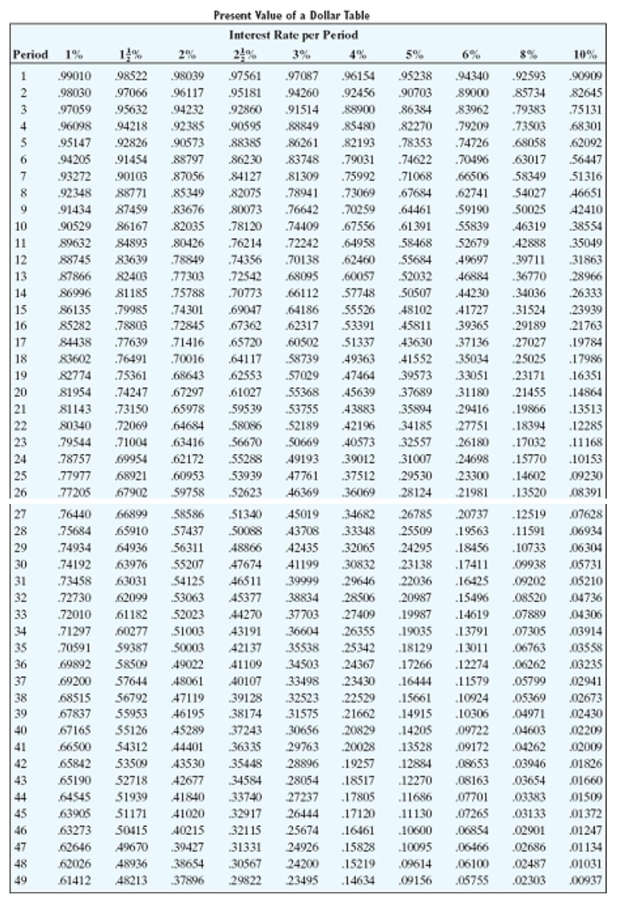
An investment of $13,335 earns 12% interest compounded monthly for 2 years. (a)What is the future value of the investment? (Use the compound interest table.)(b)If money can be deposited at 6% compounded quarterly, find the present value of the investment.
A)(a)$17,931.85
(b)$10,748.77
B)(a)$16,931.85
(b)$15,030.57
C)(a)$14,439.89
(b)$9,462.76
D)(a)$16,764.27
(b)$9,748.77

An investment of $13,335 earns 12% interest compounded monthly for 2 years. (a)What is the future value of the investment? (Use the compound interest table.)(b)If money can be deposited at 6% compounded quarterly, find the present value of the investment.
A)(a)$17,931.85
(b)$10,748.77
B)(a)$16,931.85
(b)$15,030.57
C)(a)$14,439.89
(b)$9,462.76
D)(a)$16,764.27
(b)$9,748.77
(a)$16,931.85
(b)$15,030.57
(b)$15,030.57
2
Use values from the compound interest table to find the compound amount. Round to the nearest cent. 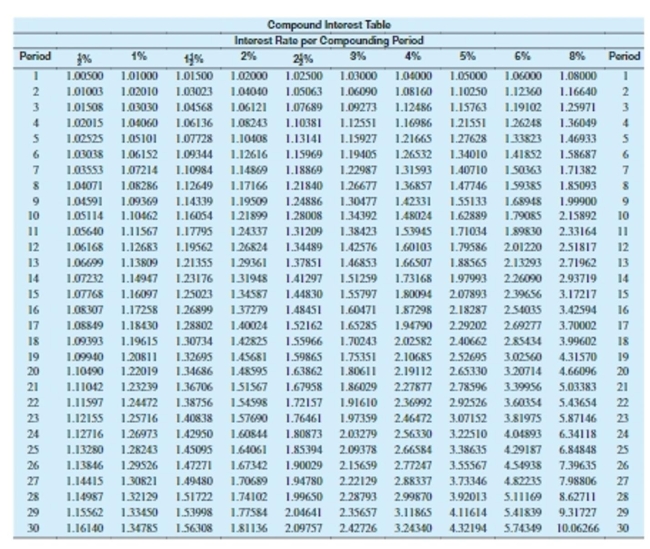
$8,000 at 8% compounded annually for 8 years
A)$12,480.00
B)$14,807.44
C)$13,710.59
D)$13,120.00

$8,000 at 8% compounded annually for 8 years
A)$12,480.00
B)$14,807.44
C)$13,710.59
D)$13,120.00
$14,807.44
3
Find the compound amount for the certificate of deposit. Assume daily compounding using the following table. Round
to the nearest cent.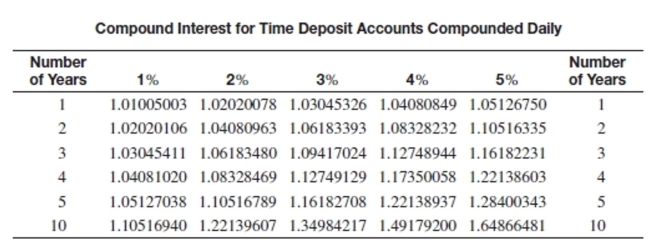
Amount: $3,112
Rate: 4%
Years: 5
A)$4,642.46
B)$3,800.96
C)$3,800.95
D)$3,995.82
to the nearest cent.

Amount: $3,112
Rate: 4%
Years: 5
A)$4,642.46
B)$3,800.96
C)$3,800.95
D)$3,995.82
$3,800.96
4
Provide an appropriate response.
Explain what is meant by the present value of money.
Explain what is meant by the present value of money.

Unlock Deck
Unlock for access to all 52 flashcards in this deck.
Unlock Deck
k this deck
5
Find the interest earned. Assume  % interest compounded daily, as in the following table, and use the exact number of
% interest compounded daily, as in the following table, and use the exact number of
days. Round to the nearest cent.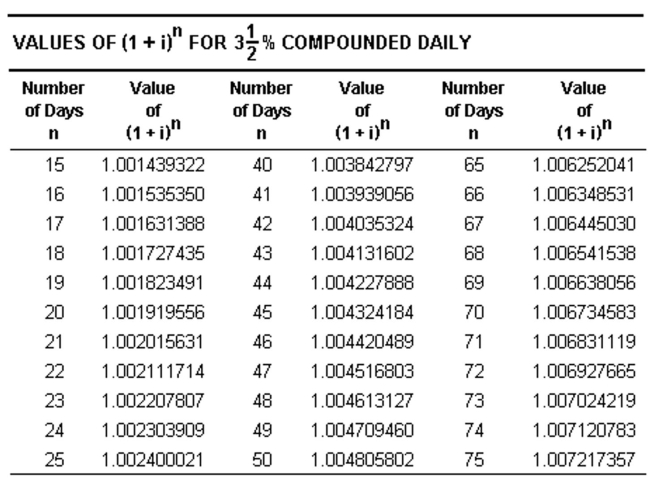
Amount: $7,000
Deposited: Oct 29
Withdrawn: Nov 18
A)$7,013.44
B)$13.44
C)$7,014.44
D)$42.41
 % interest compounded daily, as in the following table, and use the exact number of
% interest compounded daily, as in the following table, and use the exact number ofdays. Round to the nearest cent.

Amount: $7,000
Deposited: Oct 29
Withdrawn: Nov 18
A)$7,013.44
B)$13.44
C)$7,014.44
D)$42.41

Unlock Deck
Unlock for access to all 52 flashcards in this deck.
Unlock Deck
k this deck
6
Use the table to solve the problem. Round to the nearest cent. 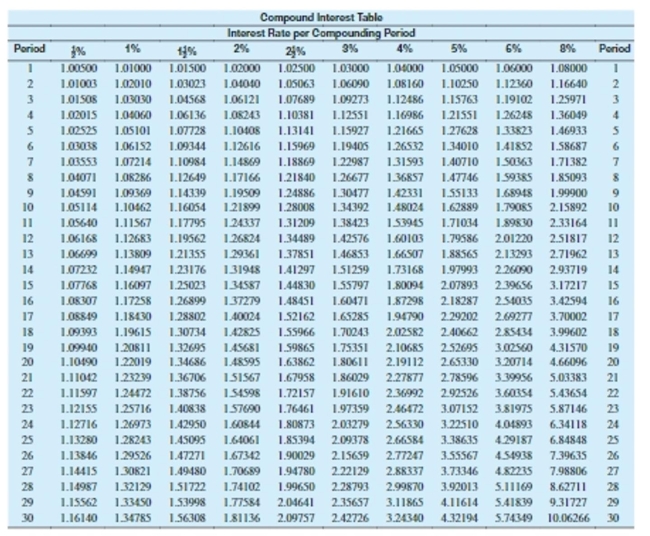
Felipe Rivera's savings account has a balance of $4,277. After 5 years what will the amount of interest be at 6% compounded quarterly?
A)$128.31
B)$1,488.52
C)$1,483.52
D)$1,474.52

Felipe Rivera's savings account has a balance of $4,277. After 5 years what will the amount of interest be at 6% compounded quarterly?
A)$128.31
B)$1,488.52
C)$1,483.52
D)$1,474.52

Unlock Deck
Unlock for access to all 52 flashcards in this deck.
Unlock Deck
k this deck
7
Solve the application problem. If no interest rate is given, assume  interest compounded daily. Round to the nearest
interest compounded daily. Round to the nearest
cent.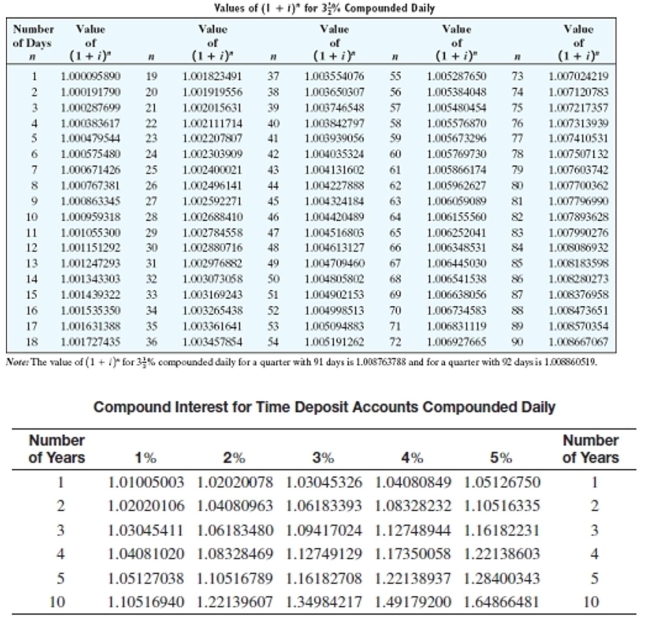
A local business deposited $460,000 in a 2-year time deposit earning 4% compounded daily. At maturity, what is the compound amount and interest earned?
A)$508,375.14; $48,375.14
B)$498,309.87; $38,309.87
C)$561,837.59; $101,837.59
D)$518,645.14; $58,645.14
 interest compounded daily. Round to the nearest
interest compounded daily. Round to the nearestcent.

A local business deposited $460,000 in a 2-year time deposit earning 4% compounded daily. At maturity, what is the compound amount and interest earned?
A)$508,375.14; $48,375.14
B)$498,309.87; $38,309.87
C)$561,837.59; $101,837.59
D)$518,645.14; $58,645.14

Unlock Deck
Unlock for access to all 52 flashcards in this deck.
Unlock Deck
k this deck
8
Provide an appropriate response.
Explain the difference between simple interest and compound interest.
Explain the difference between simple interest and compound interest.

Unlock Deck
Unlock for access to all 52 flashcards in this deck.
Unlock Deck
k this deck
9
Provide an appropriate response.
If interest is compounded monthly at 8% per year for 10 years, explain how to find the number of compounding periods and the interest rate per compounding period.
If interest is compounded monthly at 8% per year for 10 years, explain how to find the number of compounding periods and the interest rate per compounding period.

Unlock Deck
Unlock for access to all 52 flashcards in this deck.
Unlock Deck
k this deck
10
Use the table to solve the problem. Round to the nearest cent. 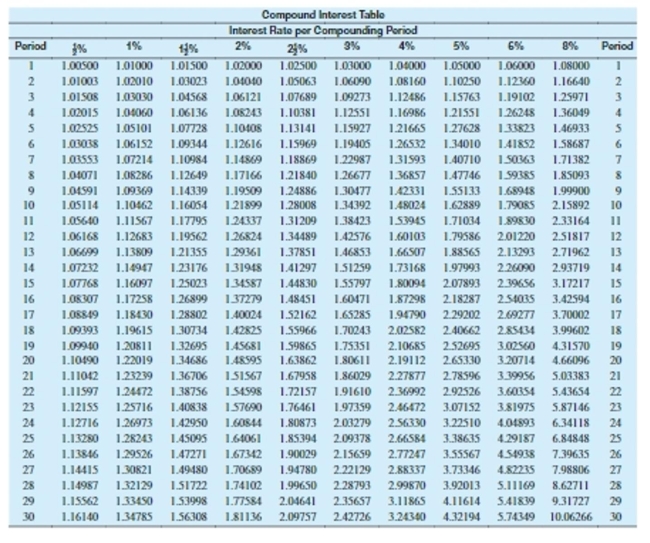
Nora Oretega's savings account has a balance of $390. After 8 years, what will the amount of interest be at 8% compounded semiannually?
A)$1,941.00
B)$312.00
C)$1,955.00
D)$1,950.00

Nora Oretega's savings account has a balance of $390. After 8 years, what will the amount of interest be at 8% compounded semiannually?
A)$1,941.00
B)$312.00
C)$1,955.00
D)$1,950.00

Unlock Deck
Unlock for access to all 52 flashcards in this deck.
Unlock Deck
k this deck
11
Provide an appropriate response.
Explain the difference between time deposit accounts and passbook accounts.
Explain the difference between time deposit accounts and passbook accounts.

Unlock Deck
Unlock for access to all 52 flashcards in this deck.
Unlock Deck
k this deck
12
Use values from the compound interest table to find the compound amount. Round to the nearest cent. 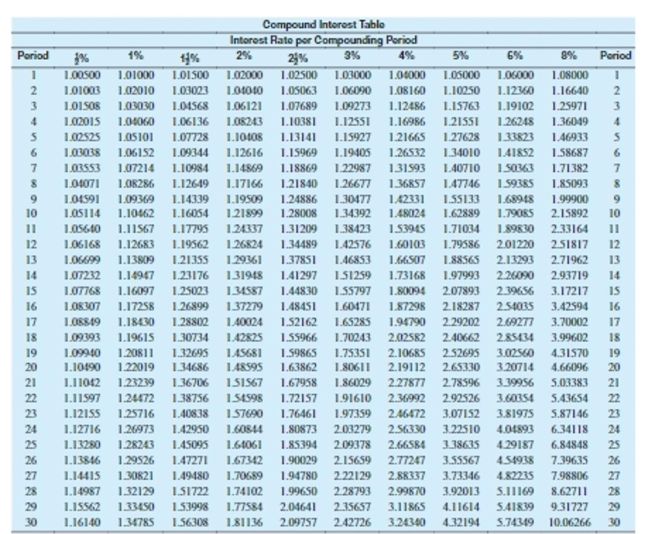
$7,670 at 8% compounded semiannually for 12 years
A)$19,314.36
B)$12,279.92
C)$19,660.51
D)$15,033.20

$7,670 at 8% compounded semiannually for 12 years
A)$19,314.36
B)$12,279.92
C)$19,660.51
D)$15,033.20

Unlock Deck
Unlock for access to all 52 flashcards in this deck.
Unlock Deck
k this deck
13
Find the present value. Round to the nearest cent. 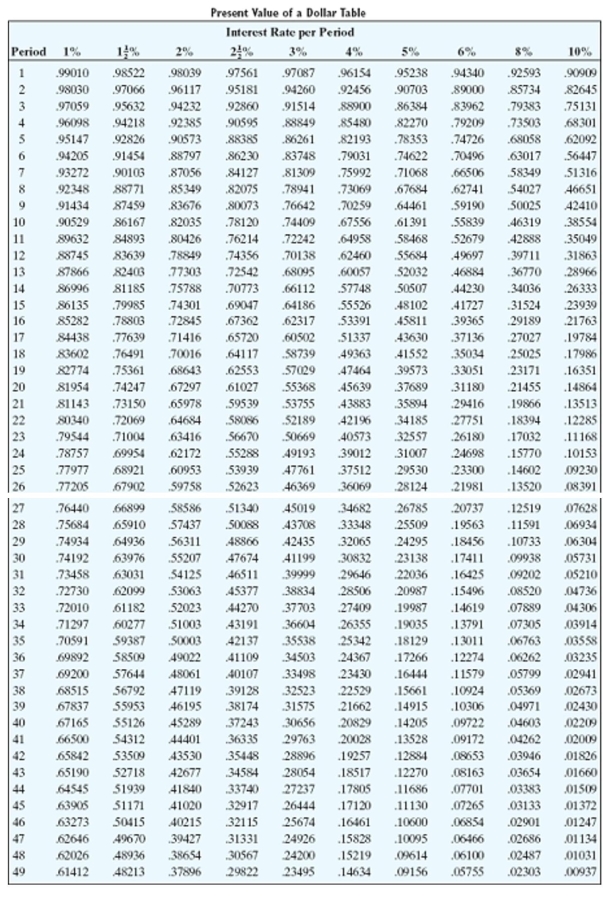

A)$4,376.18
B)$13,881.98
C)$4,052.03
D)$3,447.97


A)$4,376.18
B)$13,881.98
C)$4,052.03
D)$3,447.97

Unlock Deck
Unlock for access to all 52 flashcards in this deck.
Unlock Deck
k this deck
14
Find the compound amount for the certificate of deposit. Assume daily compounding using the following table. Round
to the nearest cent.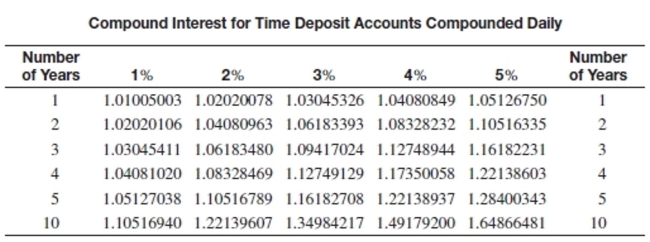
Amount: $9,100
Rate: 2%
Years: 5
A)$9,662.70
B)$12,283.56
C)$10,057.03
D)$11,114.70
to the nearest cent.

Amount: $9,100
Rate: 2%
Years: 5
A)$9,662.70
B)$12,283.56
C)$10,057.03
D)$11,114.70

Unlock Deck
Unlock for access to all 52 flashcards in this deck.
Unlock Deck
k this deck
15
Solve the application problem. If no interest rate is given, assume  % interest compounded daily. Round to the nearest
% interest compounded daily. Round to the nearest
cent.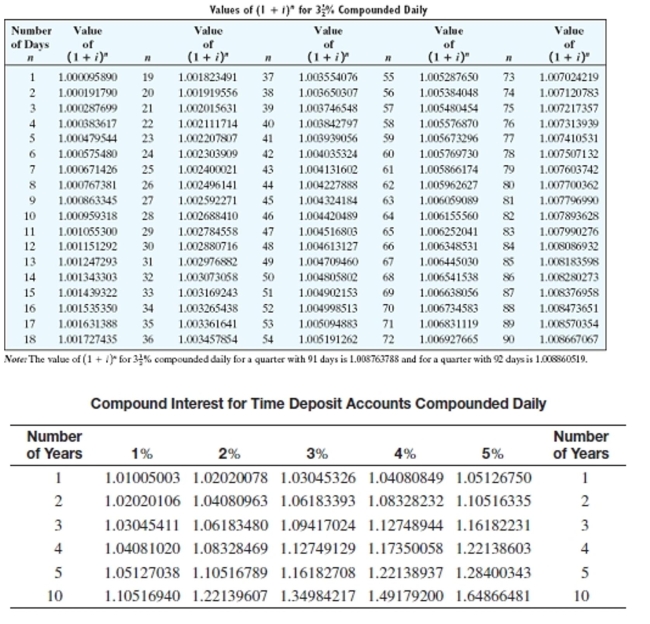
A publishing company deposited $200,000 in a 2-year time deposit earning 6% compounded daily with a Chicago bank as partial collateral for a loan. Find the compound amount and the interest earned.
A)Compound amount = $244,277.21;
Interest = $21,032.67
B)Compound amount = $421,032.67;
Interest = $1,032.67
C)Compound amount = $221,032.67;
Interest = $121,032.67
D)Compound amount = $221,032.67;
Interest = $21,032.67
 % interest compounded daily. Round to the nearest
% interest compounded daily. Round to the nearestcent.

A publishing company deposited $200,000 in a 2-year time deposit earning 6% compounded daily with a Chicago bank as partial collateral for a loan. Find the compound amount and the interest earned.
A)Compound amount = $244,277.21;
Interest = $21,032.67
B)Compound amount = $421,032.67;
Interest = $1,032.67
C)Compound amount = $221,032.67;
Interest = $121,032.67
D)Compound amount = $221,032.67;
Interest = $21,032.67

Unlock Deck
Unlock for access to all 52 flashcards in this deck.
Unlock Deck
k this deck
16
Use the table to solve the problem. Round to the nearest cent. 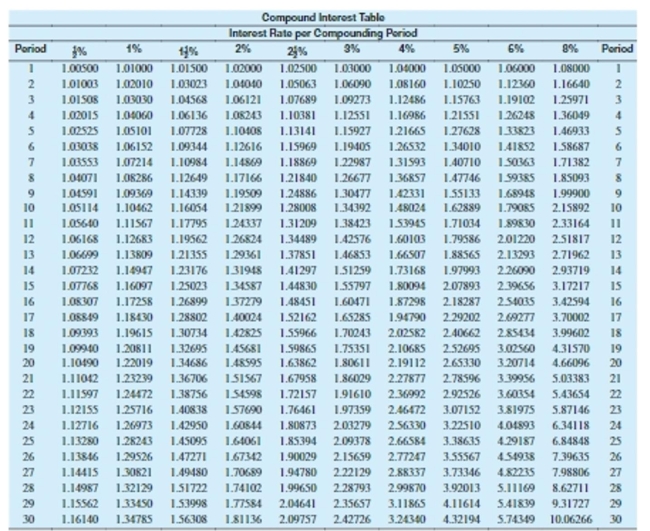
Universal Bank lends $4,300,000 for years at 8% compounded quarterly to Shining Shores Development Company to fund the building of a condominium complex. Find the future value.
years at 8% compounded quarterly to Shining Shores Development Company to fund the building of a condominium complex. Find the future value.
A)$4,734,214.00
B)$4,730,000.00
C)$4,747,544.00
D)$6,318,119.00

Universal Bank lends $4,300,000 for
 years at 8% compounded quarterly to Shining Shores Development Company to fund the building of a condominium complex. Find the future value.
years at 8% compounded quarterly to Shining Shores Development Company to fund the building of a condominium complex. Find the future value. A)$4,734,214.00
B)$4,730,000.00
C)$4,747,544.00
D)$6,318,119.00

Unlock Deck
Unlock for access to all 52 flashcards in this deck.
Unlock Deck
k this deck
17
Use values from the compound interest table to find the compound interest. Round to the nearest cent. 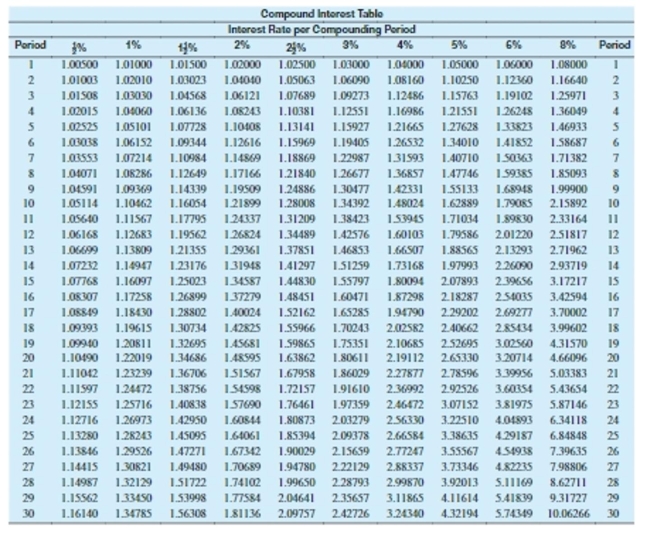
$9,000 at 8% compounded annually for 16 years
A)$10,800.00
B)$19,549.52
C)$11,520.00
D)$21,833.46

$9,000 at 8% compounded annually for 16 years
A)$10,800.00
B)$19,549.52
C)$11,520.00
D)$21,833.46

Unlock Deck
Unlock for access to all 52 flashcards in this deck.
Unlock Deck
k this deck
18
Find the present value. Round to the nearest cent. 

A)$4,548.91
B)$7,751.09
C)$19,518.55
D)$8,371.17


A)$4,548.91
B)$7,751.09
C)$19,518.55
D)$8,371.17

Unlock Deck
Unlock for access to all 52 flashcards in this deck.
Unlock Deck
k this deck
19
Use the table to solve the problem. Round to the nearest cent. 
Jenny Sherrer has $29,000 to invest and believes that she will earn 8% compounded semiannually. Find the compound amounts if she invests for 4 years and for 8 years. Then find the additional amount earned due to the longer period.
A)$45,675.29
B)$14,627.89
C)$5,762.59
D)$20,390.48

Jenny Sherrer has $29,000 to invest and believes that she will earn 8% compounded semiannually. Find the compound amounts if she invests for 4 years and for 8 years. Then find the additional amount earned due to the longer period.
A)$45,675.29
B)$14,627.89
C)$5,762.59
D)$20,390.48

Unlock Deck
Unlock for access to all 52 flashcards in this deck.
Unlock Deck
k this deck
20
Use values from the compound interest table to find the compound interest. Round to the nearest cent. 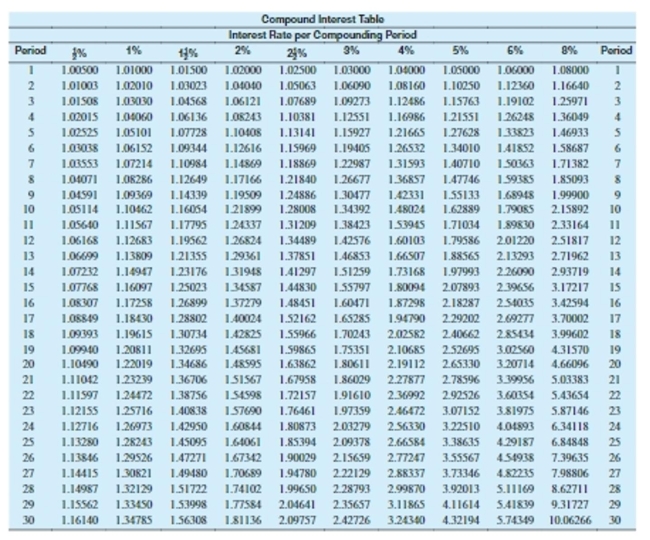
$800 at 6% compounded quarterly for 2 years
A)$98.88
B)$824.18
C)$96.00
D)$101.19

$800 at 6% compounded quarterly for 2 years
A)$98.88
B)$824.18
C)$96.00
D)$101.19

Unlock Deck
Unlock for access to all 52 flashcards in this deck.
Unlock Deck
k this deck
21
Use values from the compound interest table to find the compound amount. Round to the nearest cent. 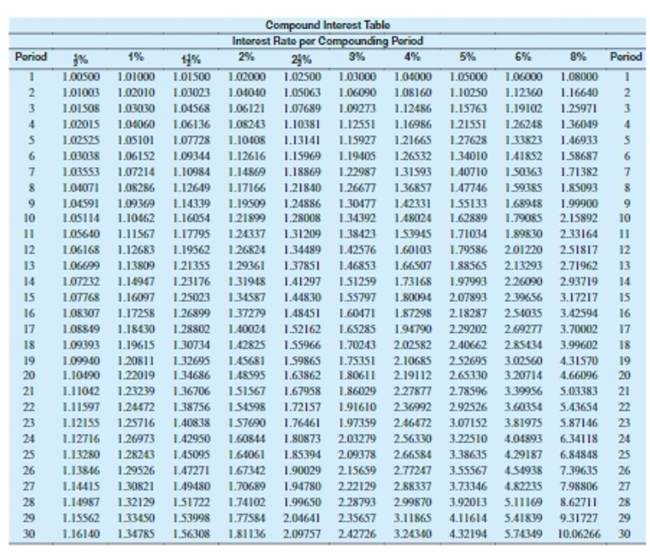
$700 at 4% compounded quarterly for 5 years
A)$735.71
B)$854.13
C)$851.66
D)$840.00

$700 at 4% compounded quarterly for 5 years
A)$735.71
B)$854.13
C)$851.66
D)$840.00

Unlock Deck
Unlock for access to all 52 flashcards in this deck.
Unlock Deck
k this deck
22
Solve the application problem. If no interest rate is given, assume  % interest compounded daily. Round to the nearest
% interest compounded daily. Round to the nearest
cent.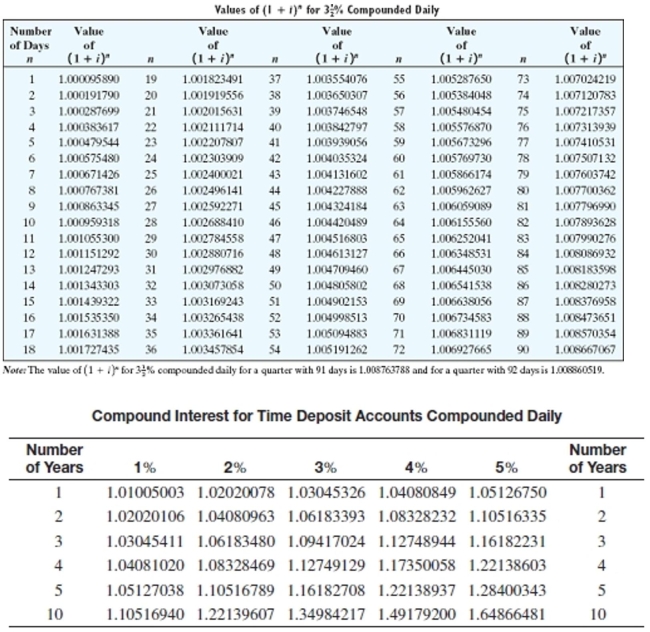
Kerry and Andy Zell are retired and after saving their entire life, they have $290,000 in a savings account paying 3% compounded daily. What is their gain or loss in purchasing power in a year in which the CPI is 4%?
A)Gain of $2,768.55
B)Loss of $301,600.00
C)Gain of $301,600.00
D)Loss of $2,768.55
 % interest compounded daily. Round to the nearest
% interest compounded daily. Round to the nearestcent.

Kerry and Andy Zell are retired and after saving their entire life, they have $290,000 in a savings account paying 3% compounded daily. What is their gain or loss in purchasing power in a year in which the CPI is 4%?
A)Gain of $2,768.55
B)Loss of $301,600.00
C)Gain of $301,600.00
D)Loss of $2,768.55

Unlock Deck
Unlock for access to all 52 flashcards in this deck.
Unlock Deck
k this deck
23
Find the interest earned. Assume  interest compounded daily, as in the following table, and use the exact number of
interest compounded daily, as in the following table, and use the exact number of
days. Round to the nearest cent.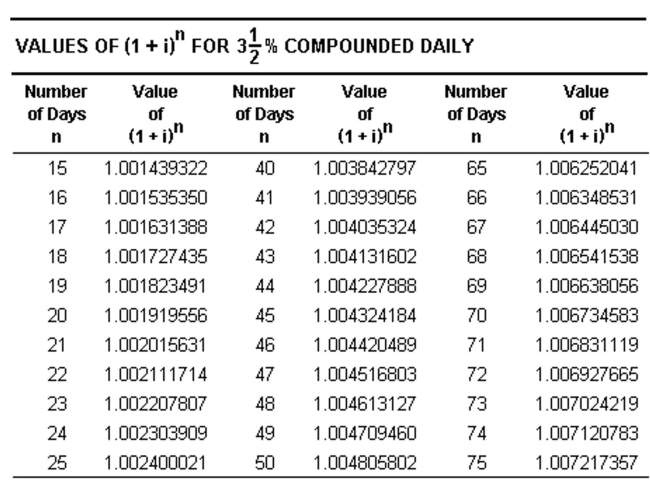
Amount: $4,070
Deposited: Sept 27
Withdrawn: Nov 10
A)$4,087.21
B)$24.66
C)$26.43
D)$17.21
 interest compounded daily, as in the following table, and use the exact number of
interest compounded daily, as in the following table, and use the exact number ofdays. Round to the nearest cent.

Amount: $4,070
Deposited: Sept 27
Withdrawn: Nov 10
A)$4,087.21
B)$24.66
C)$26.43
D)$17.21

Unlock Deck
Unlock for access to all 52 flashcards in this deck.
Unlock Deck
k this deck
24
Find the present value. Round to the nearest cent. 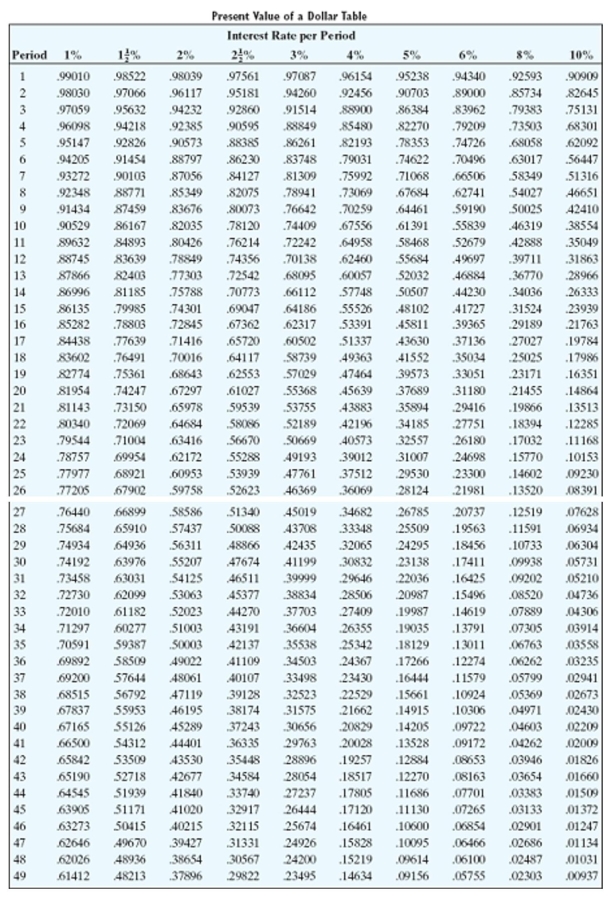

A)$4,697.01
B)$4,741.09
C)$17,244.93
D)$4,302.99


A)$4,697.01
B)$4,741.09
C)$17,244.93
D)$4,302.99

Unlock Deck
Unlock for access to all 52 flashcards in this deck.
Unlock Deck
k this deck
25
Use the table to solve the problem. Round to the nearest cent. 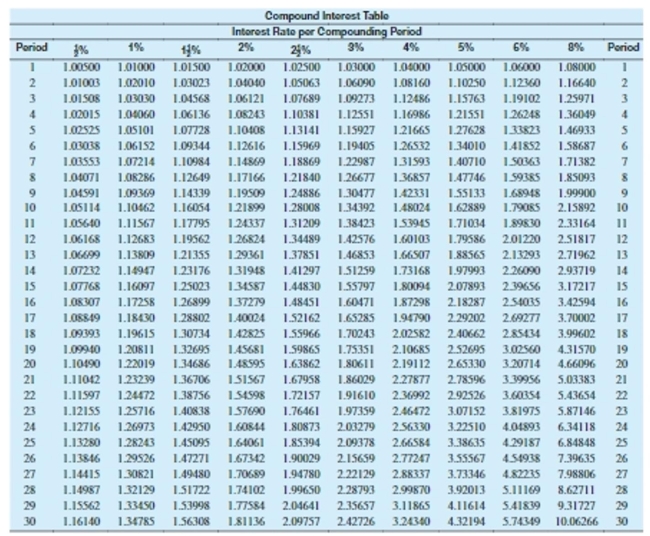
John Lee's savings account has a balance of $282. After 9 years, what will the amount of interest be at 5% compounded semiannually?
A)$70.18
B)$126.90
C)$155.47
D)$157.82

John Lee's savings account has a balance of $282. After 9 years, what will the amount of interest be at 5% compounded semiannually?
A)$70.18
B)$126.90
C)$155.47
D)$157.82

Unlock Deck
Unlock for access to all 52 flashcards in this deck.
Unlock Deck
k this deck
26
Use the table to solve the problem. Round to the nearest cent. 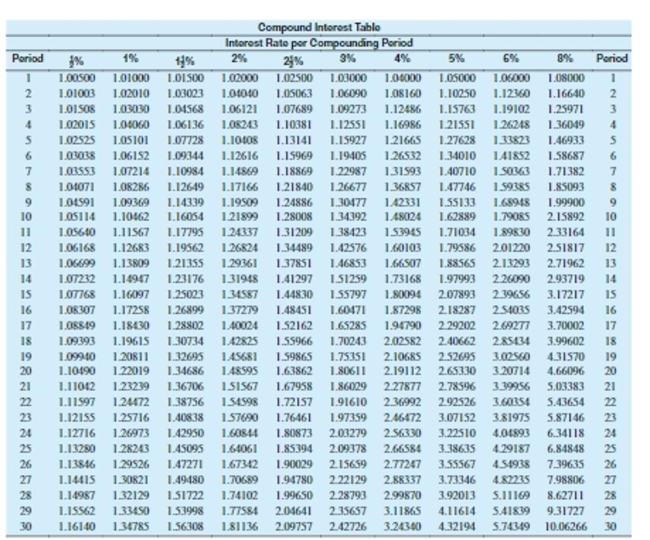
Andrea Gilford's savings account has a balance of $73. After 4 years, what will the amount of interest be at 8% compounded quarterly?
A)$27.21
B)$18.21
C)$32.21
D)$2.92

Andrea Gilford's savings account has a balance of $73. After 4 years, what will the amount of interest be at 8% compounded quarterly?
A)$27.21
B)$18.21
C)$32.21
D)$2.92

Unlock Deck
Unlock for access to all 52 flashcards in this deck.
Unlock Deck
k this deck
27
Find the interest earned. Assume  interest compounded daily, as in the following table, and use the exact number of
interest compounded daily, as in the following table, and use the exact number of
days. Round to the nearest cent.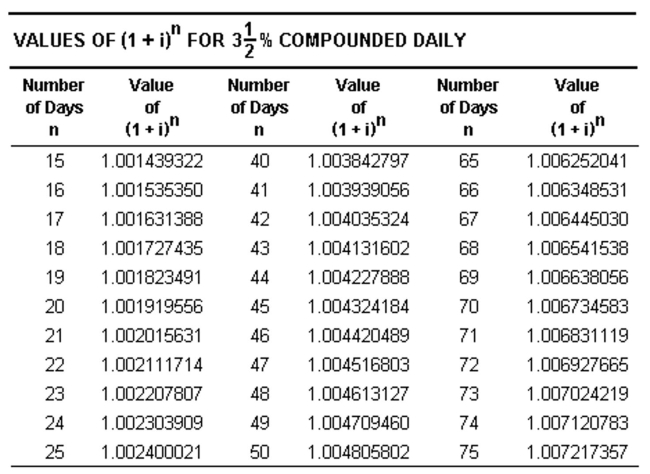
Amount: $2,200
Deposited: Jan 27
Withdrawn: Apr 5
A)$21.30
B)$21.94
C)$2,214.39
D)$14.39
 interest compounded daily, as in the following table, and use the exact number of
interest compounded daily, as in the following table, and use the exact number ofdays. Round to the nearest cent.

Amount: $2,200
Deposited: Jan 27
Withdrawn: Apr 5
A)$21.30
B)$21.94
C)$2,214.39
D)$14.39

Unlock Deck
Unlock for access to all 52 flashcards in this deck.
Unlock Deck
k this deck
28
Solve the problem. 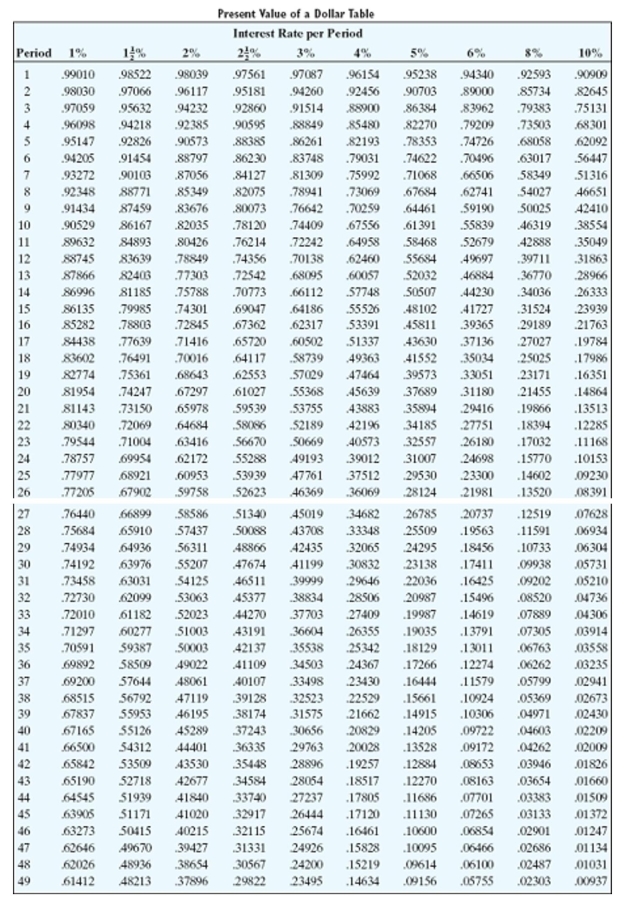
Barbara knows that she will need to buy a new car in 5 years. The car will cost $15,000 by then. How much should she invest now at 4%, compounded quarterly, so that she will have enough to buy a new car?
A)$13,585.96
B)$12,293.10
C)$12,822.06
D)$11,854.72

Barbara knows that she will need to buy a new car in 5 years. The car will cost $15,000 by then. How much should she invest now at 4%, compounded quarterly, so that she will have enough to buy a new car?
A)$13,585.96
B)$12,293.10
C)$12,822.06
D)$11,854.72

Unlock Deck
Unlock for access to all 52 flashcards in this deck.
Unlock Deck
k this deck
29
Find the compound interest earned. Round to the nearest cent. Do not use an interest table.
$19,000 at 10% compounded quarterly for year
year
A)$6,289.00
B)$1,407.89
C)$1,460.92
D)$5,700.00
$19,000 at 10% compounded quarterly for
 year
year A)$6,289.00
B)$1,407.89
C)$1,460.92
D)$5,700.00

Unlock Deck
Unlock for access to all 52 flashcards in this deck.
Unlock Deck
k this deck
30
Solve the application problem. If no interest rate is given, assume  interest compounded daily. Round to the nearest
interest compounded daily. Round to the nearest
cent.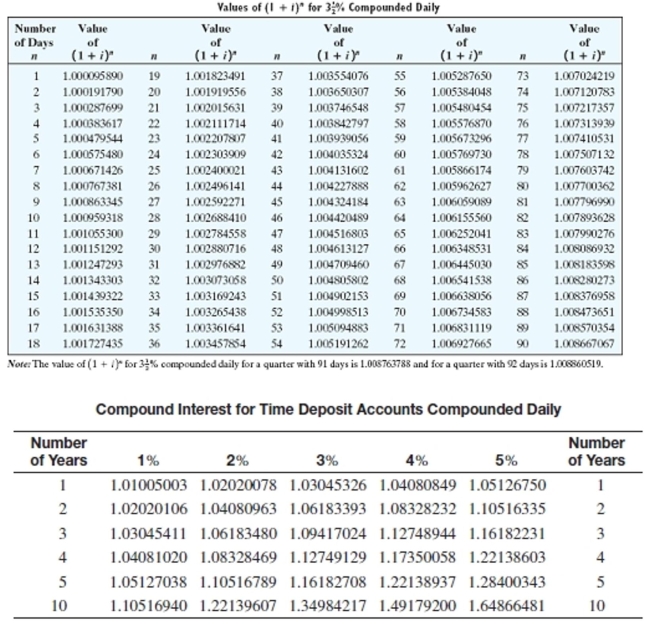
On October 1, The Bakery opened a savings account with a deposit of $15,100. A withdrawal of $7500 was made 15 days later and another withdrawal of $400 was made 8 days before January 1. Find the balance on January 1.
A)$7,277.30
B)$7,277.82
C)$7,277.14
D)$7,277.89
 interest compounded daily. Round to the nearest
interest compounded daily. Round to the nearestcent.

On October 1, The Bakery opened a savings account with a deposit of $15,100. A withdrawal of $7500 was made 15 days later and another withdrawal of $400 was made 8 days before January 1. Find the balance on January 1.
A)$7,277.30
B)$7,277.82
C)$7,277.14
D)$7,277.89

Unlock Deck
Unlock for access to all 52 flashcards in this deck.
Unlock Deck
k this deck
31
Solve the problem. 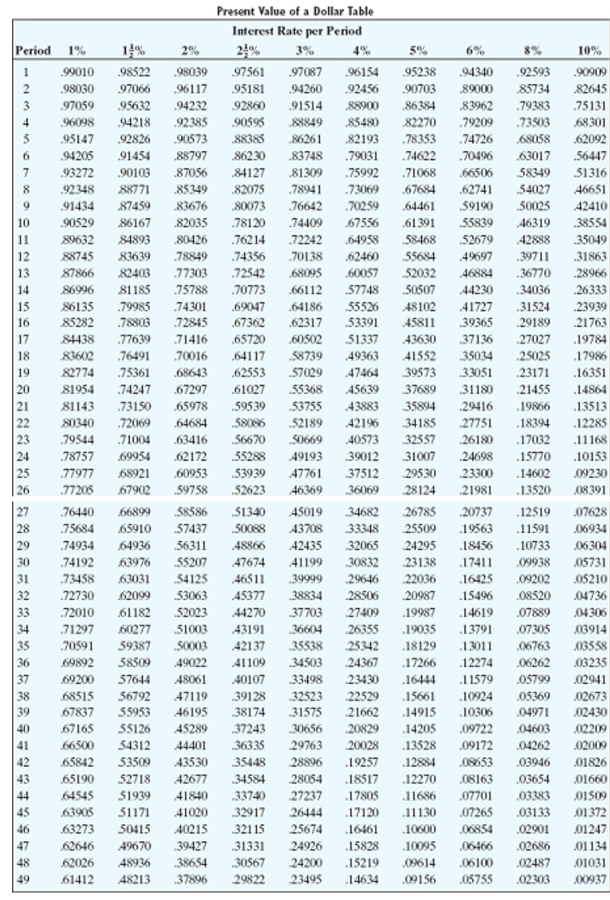
A note is due in 4 years, with interest of 4% compounded semiannually. The face value of the note is $26,000. Find the maturity value of the note and find the minimum sale price of the note if money can be deposited at 8% compounded quarterly. Use the compound interest table.
A)$30,463.14, $16,264.53
B)$28,154.27, $20,508.86
C)$30,463.16, $22,190.89
D)$35,582.80, $22,190.76

A note is due in 4 years, with interest of 4% compounded semiannually. The face value of the note is $26,000. Find the maturity value of the note and find the minimum sale price of the note if money can be deposited at 8% compounded quarterly. Use the compound interest table.
A)$30,463.14, $16,264.53
B)$28,154.27, $20,508.86
C)$30,463.16, $22,190.89
D)$35,582.80, $22,190.76

Unlock Deck
Unlock for access to all 52 flashcards in this deck.
Unlock Deck
k this deck
32
Use values from the compound interest table to find the compound amount. Round to the nearest cent. 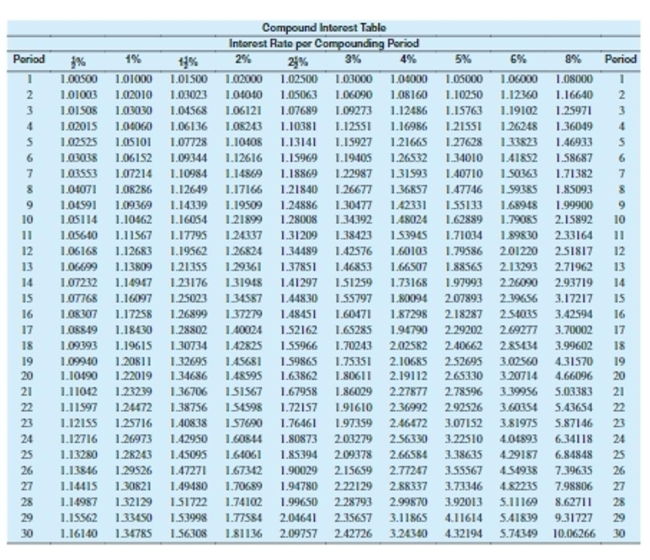
$200 at 6% compounded annually for 15 years
A)$479.31
B)$380.00
C)$368.00
D)$452.18

$200 at 6% compounded annually for 15 years
A)$479.31
B)$380.00
C)$368.00
D)$452.18

Unlock Deck
Unlock for access to all 52 flashcards in this deck.
Unlock Deck
k this deck
33
Find the interest earned. Assume  interest compounded daily, as in the following table, and use the exact number of
interest compounded daily, as in the following table, and use the exact number of
days. Round to the nearest cent.
Amount: $16,218
Deposited: Mar 16
Withdrawn: May 21
A)$161.74
B)$105.30
C)$16,320.96
D)$102.96
 interest compounded daily, as in the following table, and use the exact number of
interest compounded daily, as in the following table, and use the exact number ofdays. Round to the nearest cent.

Amount: $16,218
Deposited: Mar 16
Withdrawn: May 21
A)$161.74
B)$105.30
C)$16,320.96
D)$102.96

Unlock Deck
Unlock for access to all 52 flashcards in this deck.
Unlock Deck
k this deck
34
Solve the application problem. If no interest rate is given, assume  % interest compounded daily. Round to the nearest
% interest compounded daily. Round to the nearest
cent.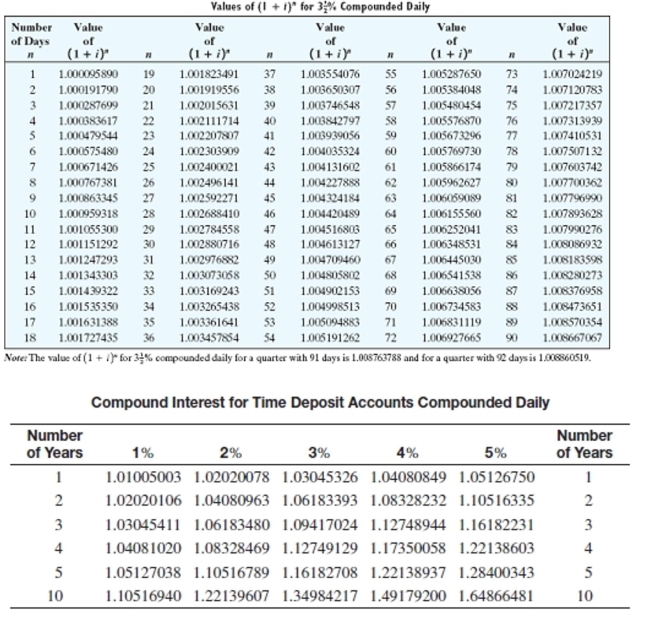
Paul Pierce has $7,000 to deposit in a certificate of deposit but is debating whether to leave it there for 2 years or for 3 years. Assume 40% compounded daily in both situations, and find the compound amount in each case.
A)$7,582.98; $7,892.43
B)$7,582.98; $7,897.43
C)$7,592.98; $7,892.43
D)$7,582.98; $15,784.85
 % interest compounded daily. Round to the nearest
% interest compounded daily. Round to the nearestcent.

Paul Pierce has $7,000 to deposit in a certificate of deposit but is debating whether to leave it there for 2 years or for 3 years. Assume 40% compounded daily in both situations, and find the compound amount in each case.
A)$7,582.98; $7,892.43
B)$7,582.98; $7,897.43
C)$7,592.98; $7,892.43
D)$7,582.98; $15,784.85

Unlock Deck
Unlock for access to all 52 flashcards in this deck.
Unlock Deck
k this deck
35
Use the table to solve the problem. Round to the nearest cent. 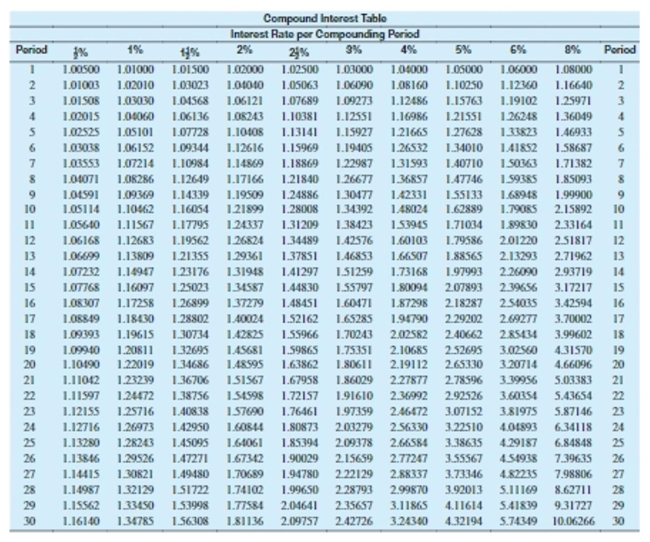
Barry Newman's savings account has a balance of $358. After 21 years, what will the amount of interest be at 4% compounded annually?
A)$143.20
B)$457.80
C)$462.80
D)$448.80

Barry Newman's savings account has a balance of $358. After 21 years, what will the amount of interest be at 4% compounded annually?
A)$143.20
B)$457.80
C)$462.80
D)$448.80

Unlock Deck
Unlock for access to all 52 flashcards in this deck.
Unlock Deck
k this deck
36
Find the compound interest earned. Round to the nearest cent. Do not use an interest table.
$2,000 at 10% compounded semiannually for 3 years
A)$600.00
B)$662.00
C)$680.19
D)$1,543.12
$2,000 at 10% compounded semiannually for 3 years
A)$600.00
B)$662.00
C)$680.19
D)$1,543.12

Unlock Deck
Unlock for access to all 52 flashcards in this deck.
Unlock Deck
k this deck
37
Provide an appropriate response.
Find the amount by which the interest compounded annually is larger than the simple interest.
Round to the nearest cent. Use the formula to find the compound amount.
to find the compound amount.
Principal: $6,260 Rate: 6% Years: 18
A)$4,847.36
B)$11,107.36
C)$4,211.56
D)$4,346.56
Find the amount by which the interest compounded annually is larger than the simple interest.
Round to the nearest cent. Use the formula
 to find the compound amount.
to find the compound amount.Principal: $6,260 Rate: 6% Years: 18
A)$4,847.36
B)$11,107.36
C)$4,211.56
D)$4,346.56

Unlock Deck
Unlock for access to all 52 flashcards in this deck.
Unlock Deck
k this deck
38
Use values from the compound interest table to find the compound interest. Round to the nearest cent. 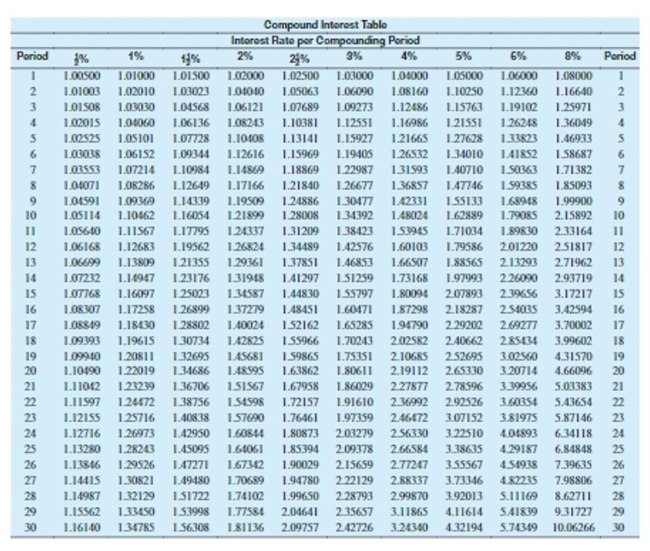
$1,250 at 4% compounded annually for 10 years
A)$500.00
B)$529.14
C)$450.00
D)$600.30

$1,250 at 4% compounded annually for 10 years
A)$500.00
B)$529.14
C)$450.00
D)$600.30

Unlock Deck
Unlock for access to all 52 flashcards in this deck.
Unlock Deck
k this deck
39
Use values from the compound interest table to find the compound interest. Round to the nearest cent. 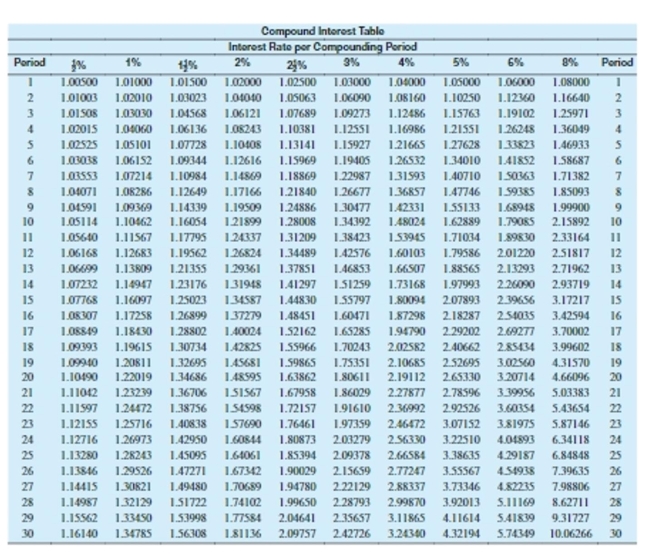
$17,000 at 8% compounded semiannually for 6 years
A)$8,160.00
B)$10,217.51
C)$9,976.86
D)$4,510.42

$17,000 at 8% compounded semiannually for 6 years
A)$8,160.00
B)$10,217.51
C)$9,976.86
D)$4,510.42

Unlock Deck
Unlock for access to all 52 flashcards in this deck.
Unlock Deck
k this deck
40
Use the table to solve the problem. Round to the nearest cent. 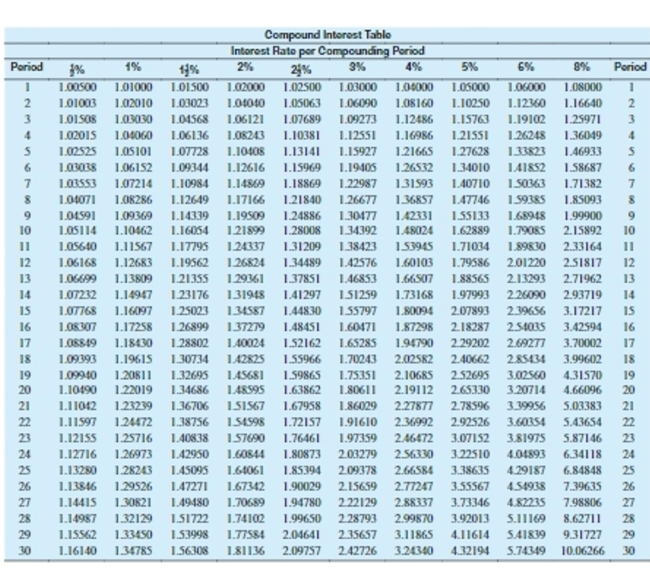
Lexi can invest $7,330 for 3 years at 8% compounded quarterly. Find the future value.
A)$92,336,743.00
B)$9,089.20
C)$9,296.20
D)$184,581,861.00

Lexi can invest $7,330 for 3 years at 8% compounded quarterly. Find the future value.
A)$92,336,743.00
B)$9,089.20
C)$9,296.20
D)$184,581,861.00

Unlock Deck
Unlock for access to all 52 flashcards in this deck.
Unlock Deck
k this deck
41
Find the present value. Round to the nearest cent. 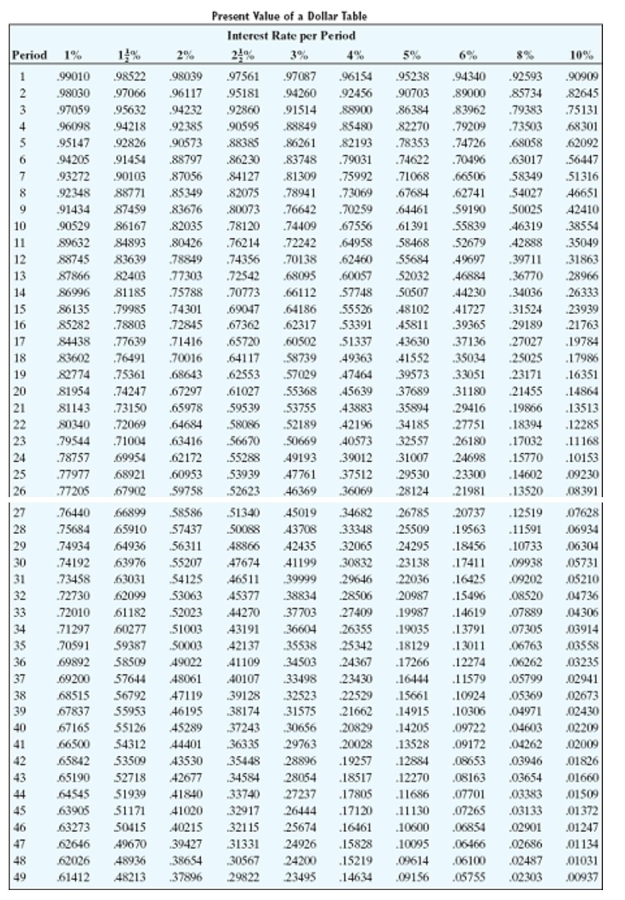

A)$6,575.71
B)$3,217.88
C)$3,242.82
D)$1,382.12


A)$6,575.71
B)$3,217.88
C)$3,242.82
D)$1,382.12

Unlock Deck
Unlock for access to all 52 flashcards in this deck.
Unlock Deck
k this deck
42
Find the simple interest for the period indicated. Then use table values to find the compound interest. Finally, find the
difference between compound interest and simple interest. Round to the nearest cent. (Interest is compounded
annually.)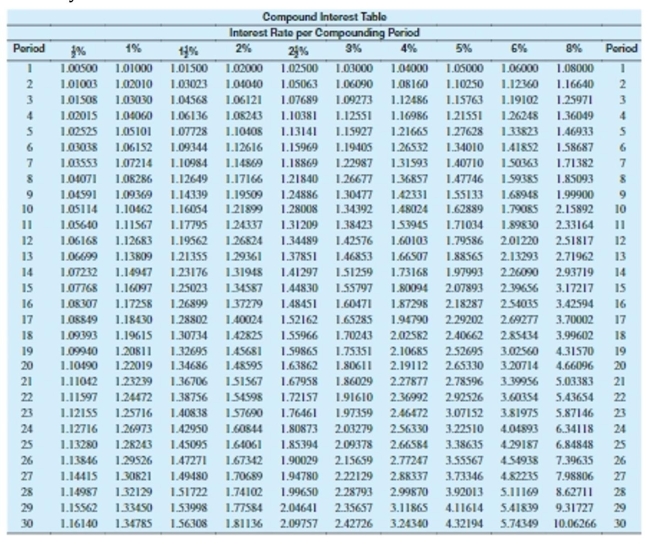
Principal: $790 Rate: 6% Years: 16
A)$458.48
B)$392.28
C)$490.08
D)$1,248.48
difference between compound interest and simple interest. Round to the nearest cent. (Interest is compounded
annually.)

Principal: $790 Rate: 6% Years: 16
A)$458.48
B)$392.28
C)$490.08
D)$1,248.48

Unlock Deck
Unlock for access to all 52 flashcards in this deck.
Unlock Deck
k this deck
43
Use values from the compound interest table to find the compound interest. Round to the nearest cent. 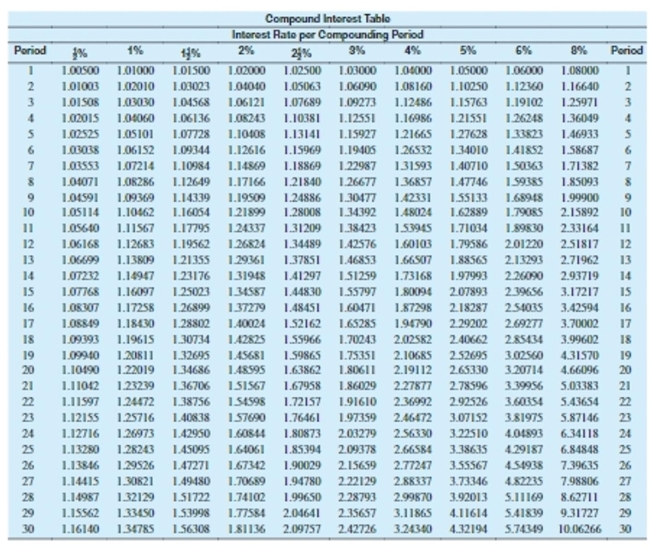
$2,450 at 8% compounded semiannually for 6 years
A)$1,472.52
B)$1,176.00
C)$1,437.84
D)$650.03

$2,450 at 8% compounded semiannually for 6 years
A)$1,472.52
B)$1,176.00
C)$1,437.84
D)$650.03

Unlock Deck
Unlock for access to all 52 flashcards in this deck.
Unlock Deck
k this deck
44
Find the simple interest for the period indicated. Then use table values to find the compound interest. Finally, find the
difference between compound interest and simple interest. Round to the nearest cent. (Interest is compounded
annually.)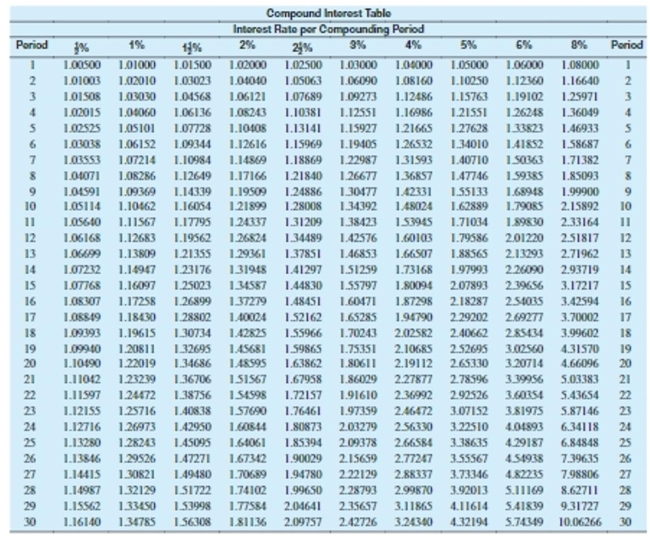
Principal: $5,929 Rate: 5% Years: 14
A)$1,659.70
B)$3,438.41
C)$1,397.16
D)$7,588.71
difference between compound interest and simple interest. Round to the nearest cent. (Interest is compounded
annually.)

Principal: $5,929 Rate: 5% Years: 14
A)$1,659.70
B)$3,438.41
C)$1,397.16
D)$7,588.71

Unlock Deck
Unlock for access to all 52 flashcards in this deck.
Unlock Deck
k this deck
45
Find the compound amount for the certificate of deposit. Assume daily compounding using the following table. Round
to the nearest cent.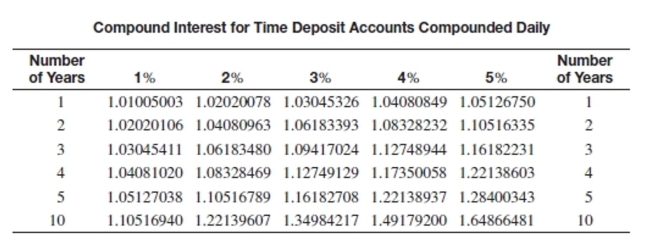
Amount: $8,400
Rate: 5%
Years: 5
A)$9,759.31
B)$13,848.78
C)$8,830.65
D)$10,785.63
to the nearest cent.

Amount: $8,400
Rate: 5%
Years: 5
A)$9,759.31
B)$13,848.78
C)$8,830.65
D)$10,785.63

Unlock Deck
Unlock for access to all 52 flashcards in this deck.
Unlock Deck
k this deck
46
Find the compound interest earned. Round to the nearest cent. Do not use an interest table.
$5,000 at 7% compounded annually for 4 years
A)$1,553.98
B)$1,400.00
C)$1,125.22
D)$351.50
$5,000 at 7% compounded annually for 4 years
A)$1,553.98
B)$1,400.00
C)$1,125.22
D)$351.50

Unlock Deck
Unlock for access to all 52 flashcards in this deck.
Unlock Deck
k this deck
47
Solve the problem. 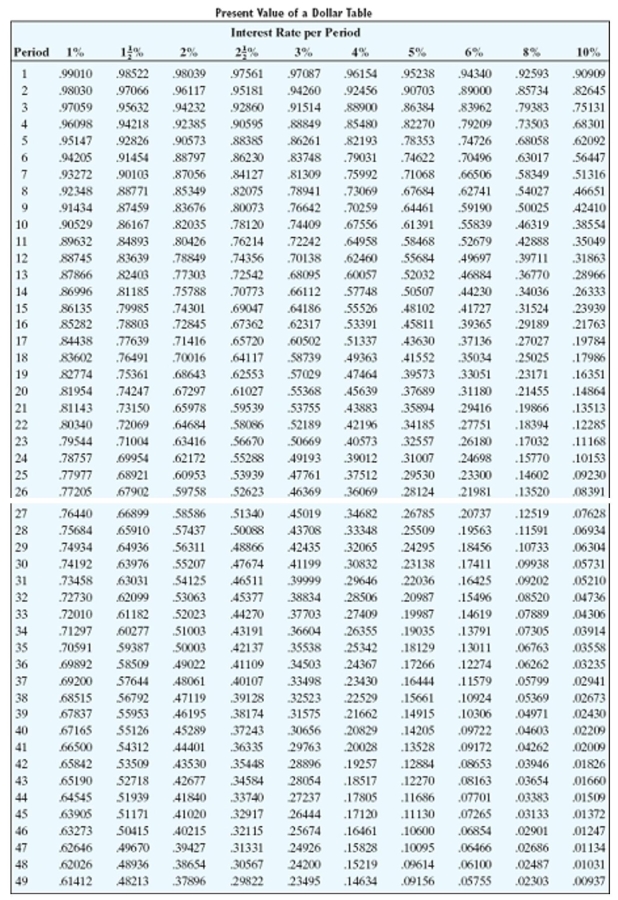
Southwest Dry Cleaners believes that it will need new equipment in 9 years. The equipment will cost $26,000. What lump sum should be invested today at 5% compounded semiannually, to yield $26,000?
A)$16,670.42
B)$23,097.31
C)$20,775.90
D)$20,905.81

Southwest Dry Cleaners believes that it will need new equipment in 9 years. The equipment will cost $26,000. What lump sum should be invested today at 5% compounded semiannually, to yield $26,000?
A)$16,670.42
B)$23,097.31
C)$20,775.90
D)$20,905.81

Unlock Deck
Unlock for access to all 52 flashcards in this deck.
Unlock Deck
k this deck
48
Find the compound amount for the certificate of deposit. Assume daily compounding using the following table. Round
to the nearest cent.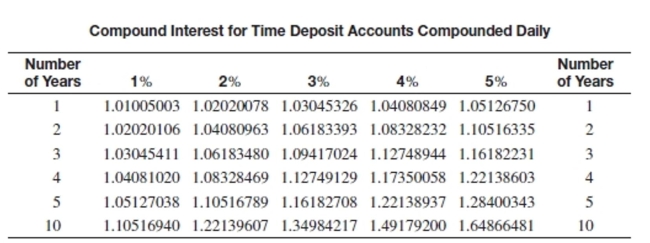
Amount: $4,500
Rate: 3%
Years: 4
A)$5,228.22
B)$4,874.78
C)$5,073.71
D)$4,637.04
to the nearest cent.

Amount: $4,500
Rate: 3%
Years: 4
A)$5,228.22
B)$4,874.78
C)$5,073.71
D)$4,637.04

Unlock Deck
Unlock for access to all 52 flashcards in this deck.
Unlock Deck
k this deck
49
Find the present value. Round to the nearest cent. 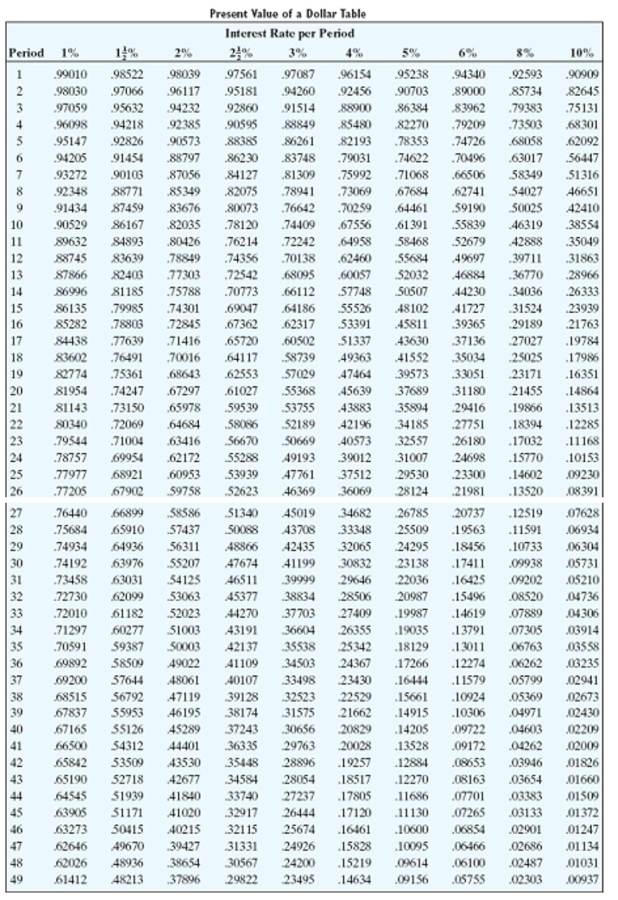

A)$5,232.48
B)$23,775.16
C)$10,809.03
D)$10,767.52


A)$5,232.48
B)$23,775.16
C)$10,809.03
D)$10,767.52

Unlock Deck
Unlock for access to all 52 flashcards in this deck.
Unlock Deck
k this deck
50
Provide an appropriate response.
Find the amount by which the interest compounded annually is larger than the simple interest.
Round to the nearest cent. Use the formula to find the compound amount.
to find the compound amount.
Principal: $620 Rate: 5% Years: 7
A)$438.40
B)$655.40
C)$35.40
D)$24.86
Find the amount by which the interest compounded annually is larger than the simple interest.
Round to the nearest cent. Use the formula
 to find the compound amount.
to find the compound amount.Principal: $620 Rate: 5% Years: 7
A)$438.40
B)$655.40
C)$35.40
D)$24.86

Unlock Deck
Unlock for access to all 52 flashcards in this deck.
Unlock Deck
k this deck
51
Use the table to solve the problem. Round to the nearest cent. 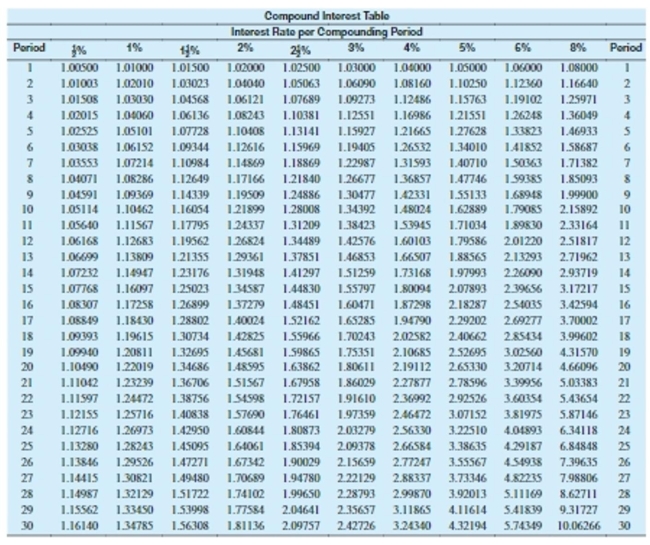
A bank has $550,000 to lend for 9 months. It can lend it to a local contractor at a simple interest rate of 12%, or it can lend it to a small business that will pay 12% compounded monthly. If the bank wants to maximize its interest earned, who should receive the loan and what is the additional interest earned?
A)Contractor; $2,029.50
B)Business; $2,029.50
C)Business; $925,694.00
D)Contractor; $14,470.50

A bank has $550,000 to lend for 9 months. It can lend it to a local contractor at a simple interest rate of 12%, or it can lend it to a small business that will pay 12% compounded monthly. If the bank wants to maximize its interest earned, who should receive the loan and what is the additional interest earned?
A)Contractor; $2,029.50
B)Business; $2,029.50
C)Business; $925,694.00
D)Contractor; $14,470.50

Unlock Deck
Unlock for access to all 52 flashcards in this deck.
Unlock Deck
k this deck
52
Use values from the compound interest table to find the compound amount. Round to the nearest cent. 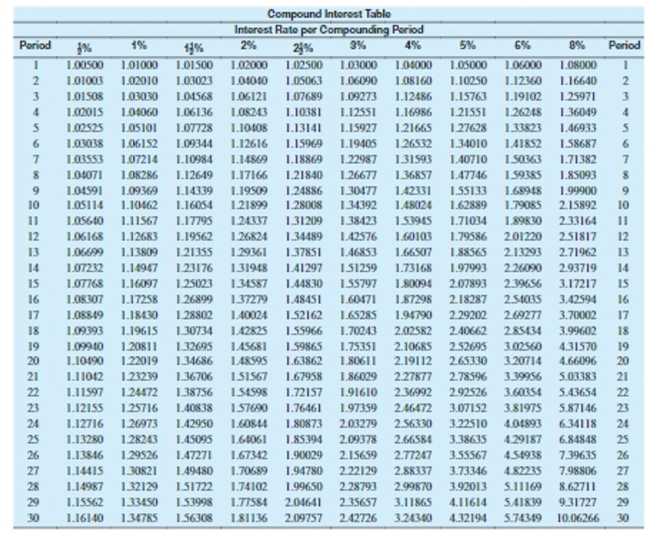
$12,000 at 8% compounded semiannually for 12 years
A)$23,520.00
B)$30,218.04
C)$30,759.60
D)$19,212.39

$12,000 at 8% compounded semiannually for 12 years
A)$23,520.00
B)$30,218.04
C)$30,759.60
D)$19,212.39

Unlock Deck
Unlock for access to all 52 flashcards in this deck.
Unlock Deck
k this deck



